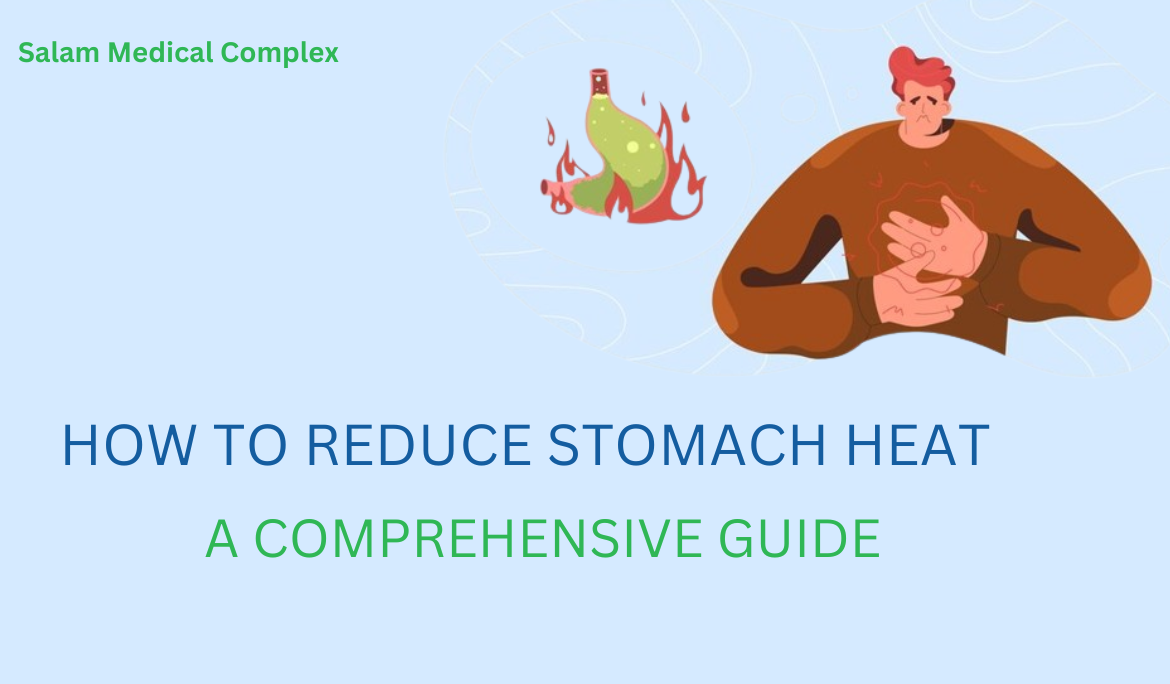How to Reduce Stomach Heat: Symptoms, Causes, & Remedies Explained!
Do you ever feel a warm sensation in your stomach after eating your favorite spicy dishes? Also, have you observed increased body heat during warm weather, particularly around your midsection? If this happens to you, you might have a stomach heat issue. Although there are various ways to reduce stomach heat, finding the most effective ones might be difficult. Don’t worry; in this guide, we’ll discuss the potential reasons and symptoms of stomach heat. Also, we’ll explore treatment options, including home remedies, and guide on when to seek professional medical advice.
How to Diagnose Stomach Heat?
Diagnosing Stomach Heat, a prevalent ailment, involves a comprehensive approach by a qualified healthcare professional. A physical examination, medical records review, and evaluation of symptoms usually determine the diagnosis.
In the absence of visible symptoms, your doctor might conduct additional diagnostic tests such as blood or urine tests. Quick identification and treatment of stomach heat are crucial so that the surfer may get and return to normal condition.
How to Diagnose Stomach Heat at Home?

Here are some symptoms of stomach heat that will help you diagnose this issue at your home:
- Heartburn: In case of stomach heat, you’ll feel a burning sensation in the chest, often triggered by stomach acid reflux into the esophagus.
- Acidity: You might also have reactions to food, including frequent belching, sour taste, and discomfort.
- Nausea: You may experience nausea and vomiting for an extended period.
- Abdominal Pain: Intense or cramp-like pain in the upper abdomen, frequently accompanied by a sense of fullness.
- Diarrhea: Loose and watery stools, sometimes with a sense of urgency.
- Bloating: Fullness and discomfort in the abdomen, often accompanied by gas.
Why Stomach Heat Happen: 7 Major Causes
Understanding the causes of stomach heat is crucial before treating it. Here are some contributing factors that cause stomach heat:
1. Functional Dyspepsia
According to research, functional dyspepsia is experienced by over 1 in 5 people. This disease is characterized by pain or a burning sensation in the upper abdomen and a persistent feeling of fullness.
2. Peptic Ulcers
In peptic ulcer disease, sores develop on the inside and the upper part of the small intestine. People with peptic ulcers may have a burning sensation in the stomach.
3. Stomach Infections
H. pylori, or Helicobacter pylori, a stomach-infecting bacterium, can contribute to stomach burning. Symptoms may also include nausea, burping, bloating, loss of appetite, and stomach ache.
4. Irritable Bowel Syndrome (IBS)
According to a study, IBS affects approximately 10–15% of people. Symptoms include stomach burning, cramps, bloating, gas, constipation, and diarrhea.
5. Medication
Certain medications, particularly non-steroidal anti-inflammatory drugs (NSAIDs) like Celecoxib, Ibuprofen, Aspirin, Oxaprozin, and Naproxen, can increase stomach heat. Also, it adversely affects the gastrointestinal system.
6. Gastroesophageal Reflux Disease
Gastroesophageal reflux disease is characterized by frequent acid reflux. This phenomenon occurs when stomach acid moves upward into the esophagus. Due to this, you’ll feel a burning sensation in your stomach and chest.
Additional symptoms of GERD may include:
- Difficulty Swallowing
- Sour Taste in the Mouth
- Regurgitation
- Chronic Cough
- Gas and Bloating
7. Reactions to Certain Foods
Some people may show stomach burning due to strong reactions to specific foods. Foods that could potentially cause gastrointestinal issues include:
- Dairy: People with lactose intolerance.
- Gluten: People with gluten intolerance.
- Nightshade Foods: Examples include eggplant, bell pepper, and tomato.
- Alcohol: Consumption of alcohol can irritate the digestive tract, stomach, and intestines, leading to stomach burning.
Home Remedies for Treating Stomach Heat

Stomach heat can be uncomfortable, but there are simple home remedies to control stomach heat:
- Yogurt: Consuming yogurt cools the stomach and regulates gut flora.
- Mint Leaves and Lemon Juice: Mixing mint leaves and lemon juice reduces inflammation and stomach heat.
- Hydrating Foods: Eat cucumber, watermelon, and drink coconut water to hydrate your body to reduce stomach heat.
- Banana: Bananas effectively manage stomach acids, relieving the discomfort of burning sensations.
- Almond: To prevent stomach heat, eat soaked almonds in your breakfast or use them as a cereal garnish.
- Boiled Rice: Rice brings a soothing effect to the stomach while enhancing its water content. Make a boiled rice mixture with curd, and don’t add any spices that may irritate the stomach lining.
- Fennel Seeds: Fennel seeds enhance the secretion of digestive enzymes, promote digestive function, and alleviate symptoms associated with stomach heat.
- Cold Milk: A glass of cold milk reduces stomach heat and minimizes excess acid secretion.
Herbal Remedies for Reducing Stomach Heat
Here are some herbal remedies that will help you reduce the discomfort of stomach heat:
- Peppermint Tea: Peppermint tea’s cooling properties help soothe stomach inflammation.
- Ginger: Ginger promotes digestion and relieves stomach discomfort.
- Licorice Root: With anti-inflammatory properties, licorice root aids in reducing stomach heat and calming an upset stomach.
While these herbal remedies may not suit everyone, they offer a natural alternative to over-the-counter medications for reducing stomach heat.
What Should You Avoid To Prevent Stomach Heat?
To prevent stomach heat, you must avoid the following food and drinks:
- Dairy
- Gluten
- Caffeine
- Alcohol
- Fried Food
- Fatty Food
- Chocolate
- Citrus
- Alliums (Garlic, Leeks, Onions)
- Nightshades (Eggplant, Bell Pepper, Tomatoes)
- Spicy food
- Carbonated beverages
Top 13 Proven Tips for Keeping Your Stomach Cool

- Make a routine of staying hydrated throughout the day.
- Gargle with a mixture of turmeric and water to effectively alleviate stomach heat.
- After lunch, consume buttermilk or yogurt to cool the stomach and enhance digestion.
- Add 1-2 tablespoons of clarified butter from desi cow in your meals; it’s a top-notch remedy to reduce stomach heat.
- Drink lukewarm lemon water to alleviate stomach heat.
- Post-meal, eat a piece of jaggery and drink water to enhance digestion and regulate body temperature.
- For a quick reduction of excess stomach heat, consider consuming coconut water.
- Lemon water with a pinch or two of black salt effectively reduces excess heat and aids digestion.
- Adopt eating slowly and refrain from heavy meals, especially at night.
- Eat in moderation, aligned with your hunger levels.
- Avoid drinking water during meals; wait an hour after eating. However, you can immediately consume buttermilk, yogurt, or lemon juice after meals.
- Honey is another effective remedy for reducing stomach heat.
- Sugarcane juice stands out as an excellent beverage for reducing excess stomach heat.
Conclusion
Stomach heat can be reduced through natural methods and lifestyle changes. A balanced diet, avoiding spicy foods, staying well-hydrated, exercising regularly, and using herbal remedies can effectively handle stomach heat. Moreover, reducing activities such as smoking and alcohol intake can speed up your healing process. However, if severe abdominal discomfort continues, it’s recommended to consult with a doctor. Following these suggestions can help you reduce stomach heat and support a healthier digestive system.
FAQs
Do I Need To Be Concerned About A Burning Sensation In My Stomach?
Yes, if the burning sensation persists for more than two weeks, it’s crucial to consult with a healthcare provider to identify the reasons causing the discomfort.
How Long Does It Take For Stomach Heat To Be Cured?
Complete recovery from stomach heat takes two weeks.
Consult the best gastroenterologist in Lahore for advice.


